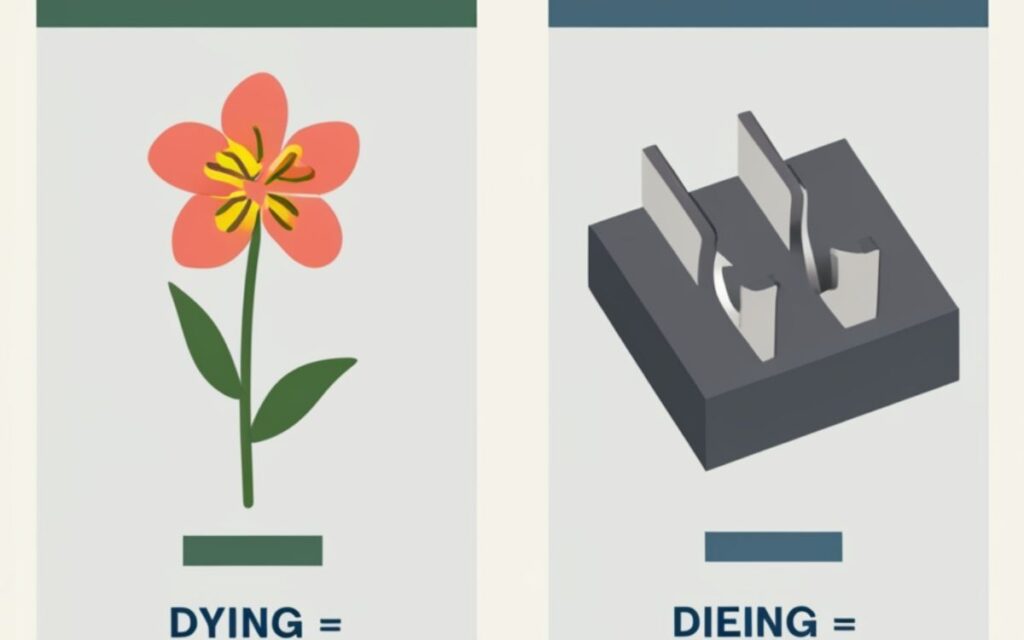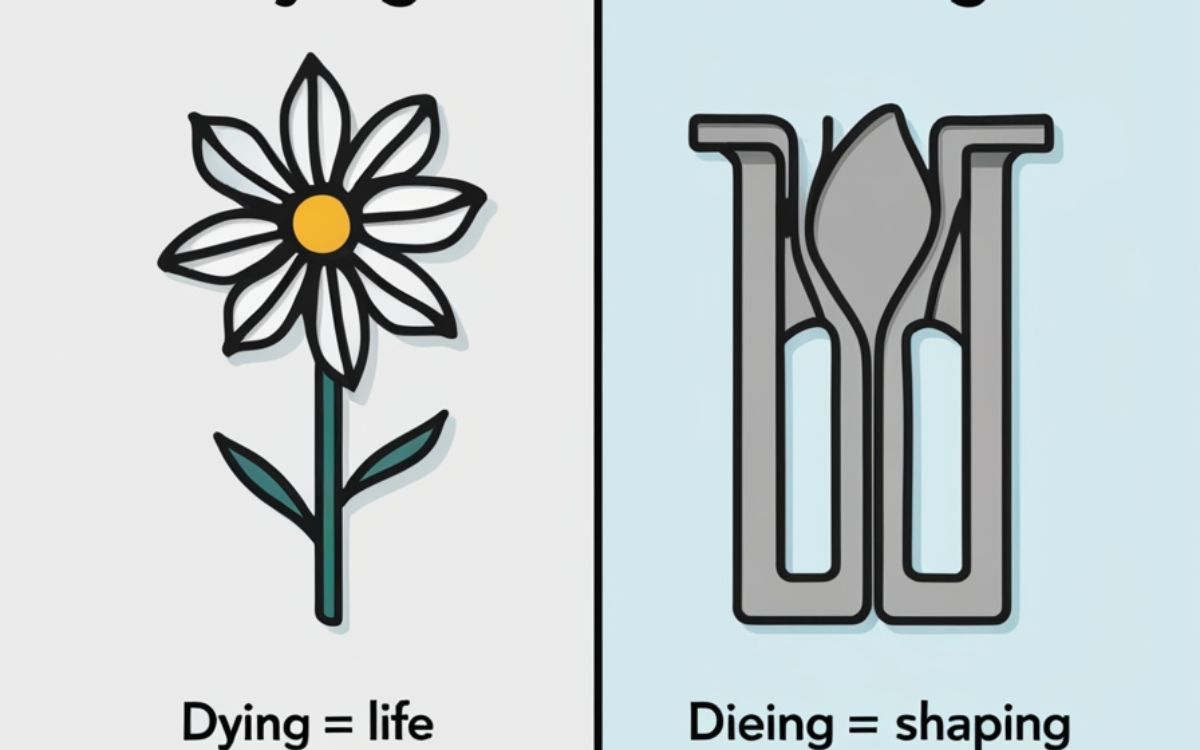Dying means when a person, animal, or plant stops living. People also use it when they feel very tired or embarrassed. For example, “I’m dying of laughter.” It shows strong feelings in simple everyday talk.
Dieing has a different meaning. It is used in factories or workshops where a die cuts or shapes metal, cloth, or plastic. Workers use tools for dieing materials to make cars, machines, or other products.
Using the right spelling helps writing look clean and correct. Mixing dieing and dying can confuse readers. When you learn the difference, your grammar becomes better and your sentences sound clear and smart.
Understanding the Basics: ‘Die,’ ‘Dying,’ and the Confusion
The word die means when life ends or something stops living. It is a simple verb that shows an ending. The form dying tells that this action is happening now, like “The flower is dying in the heat.”
Many young learners mix these spellings. The word dying fits when life or energy fades. The word die stays as the root form. Knowing their meanings helps students write correctly and speak with more confidence every day.
See also : Adamance Meaning & Usage Explained Simply
What Does ‘Dying’ Actually Mean?
- Literal Meaning: The word dying means the process of life ending for a person, animal, or plant.
- Emotional Use: It can show strong feelings like sadness, fear, or pain in daily talk or stories.
- Figurative Meaning: People say “I’m dying of laughter” or “I’m dying to know,” to express excitement or emotion.
- Common Usage: The form dying is used often in books, movies, and conversations to show deep feelings or dramatic moments.
‘Dieing’ – Is It a Real Word or Just a Misspelling?
The word dieing looks like a mistake when used for life or death. Most of the time, writers mean dying instead. Only workers in factories or metal shops use dieing when shaping materials with a special tool called a die.
This spelling is rare in daily writing. Students should use dying for people, plants, or animals. The form dieing belongs in industrial work or technical books. Learning this difference helps every learner write clearly and confidently.
The Rare Case When ‘Dieing’ Is Actually Correct

The word dieing becomes right only in factory or workshop language. It means shaping or cutting materials like metal, cloth, or plastic with a tool called a die. Workers use this process to make car parts or machine pieces.
In normal writing, people almost never use dieing. It belongs to industries where machines press or mold materials into shapes. Students should remember that dieing is about making things, while dying is about life ending or strong emotion.
Die vs. Dieing vs. Dying – Grammar Table Comparison
| Word | Type | Meaning | Example |
| Die | Verb (base) | To stop living | People die without water. |
| Dying | Participle | Ongoing act of dying | She is dying of laughter. |
| Dieing | Technical | Using a die in manufacturing tools | Dieing metal sheets for stamping parts. |
Figurative Language: How ‘Dying’ Lives in Everyday English
- Expressing Emotion: The word dying often shows strong feelings, like saying “I’m dying of laughter” when something is very funny.
- Showing Excitement: People use it to share eagerness, such as “I’m dying to see you.”
- Adding Drama: Writers use dying to make moments in stories or movies sound deeper or more emotional.
- Everyday Speech: In daily talk, dying adds feeling and color, helping sentences sound lively and natural.
Common Spelling Mistakes and How to Avoid Them
- Mixing Words: Many people write dieing instead of dying, which changes the meaning completely.
- Check Carefully: Always reread sentences to make sure dying fits the idea of life or emotion.
- Use Memory Tricks: Remember, dying comes from die + ing, but the “e” is dropped before adding “ing.”
- Practice Often: Writing short examples with dying helps you remember the correct spelling easily.
See also : One Fell Swoop: Meaning, Origin & Modern Usage
Why It Matters: Precision in Writing
Using the right words shows care and skill in writing. When a student writes dying or dieing correctly, the meaning stays clear. Small spelling mistakes can change ideas and confuse readers who try to understand simple sentences.
Good writers always check every word for accuracy. Choosing the correct form of dying helps messages sound neat and professional. Clear spelling builds confidence, improves grammar, and helps young learners express their thoughts in a smarter and more organized way.
Dieing in Industry: A Closer Look
In factories, the word dieing means shaping materials like metal, plastic, or cloth. A die is a strong tool that cuts or molds objects into the right shape. Workers use it to make machines, car parts, and many useful items.
This process needs careful work and strong machines. The spelling dieing fits only in technical or industrial writing. It helps workers and engineers describe their jobs correctly and keeps communication clear in training manuals and workplace guides.
Dying in Pop Culture and Media

- Movies and Shows: The word dying often appears in emotional scenes to show loss, love, or deep feelings.
- Music Lyrics: Singers use dying to express heartbreak, hope, or strong emotions in songs.
- Books and Stories: Authors include dying to make characters’ experiences more powerful and touching.
- Daily Expressions: In social media and jokes, people say “I’m dying of laughter” to share fun and excitement.
Side-by-Side Visual Comparison
| Aspect | Dying | Dieing |
| Common Use | Yes | Rare (industry-specific) |
| Meaning | Participle of “die” | Related to tool use in manufacturing |
| Emotion/Context | High emotion or drama | Technical process |
| Typical Frequency | Very high | Very low |
Final Thoughts
Knowing the difference between dying and dieing makes writing clear and correct. These words look alike but carry very different meanings. Learning them early helps students write better and understand how spelling changes the sense of a sentence.
Writers should always choose the right word for the right idea. Using dying in daily talk and dieing for factory work keeps meaning accurate. Careful spelling builds strong language habits and improves both reading and writing skills.
FAQs
Which is correct, dieing or dying?
Dying is correct for life ending or emotion. Dieing is only right in factories when shaping materials with a die tool.
Is it I’m dying or I’m dieing?
The correct phrase is I’m dying. The form dieing is wrong unless used in an industrial or technical setting.
Is it dying or dyeing my hair?
Use dyeing when coloring hair or fabric. Dying means the process of life ending or expressing strong emotion.
What is the meaning of dieing?
Dieing means shaping or cutting materials using a die in factories or metal workshops. It’s not used for life or emotion.

Join Bibcia on a journey to master English grammar. Discover easy lessons, writing tips, and practical examples designed to make learning grammar simple and effective.










